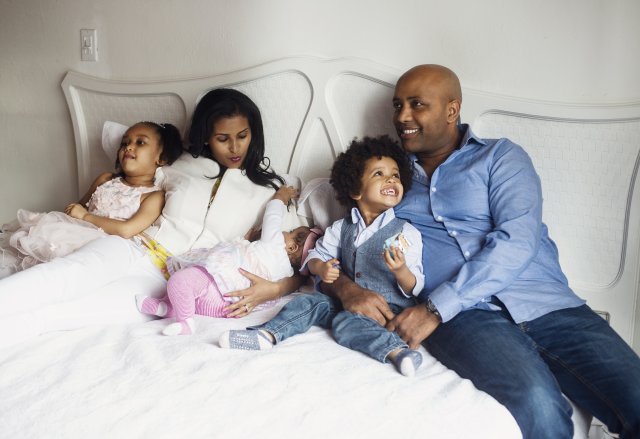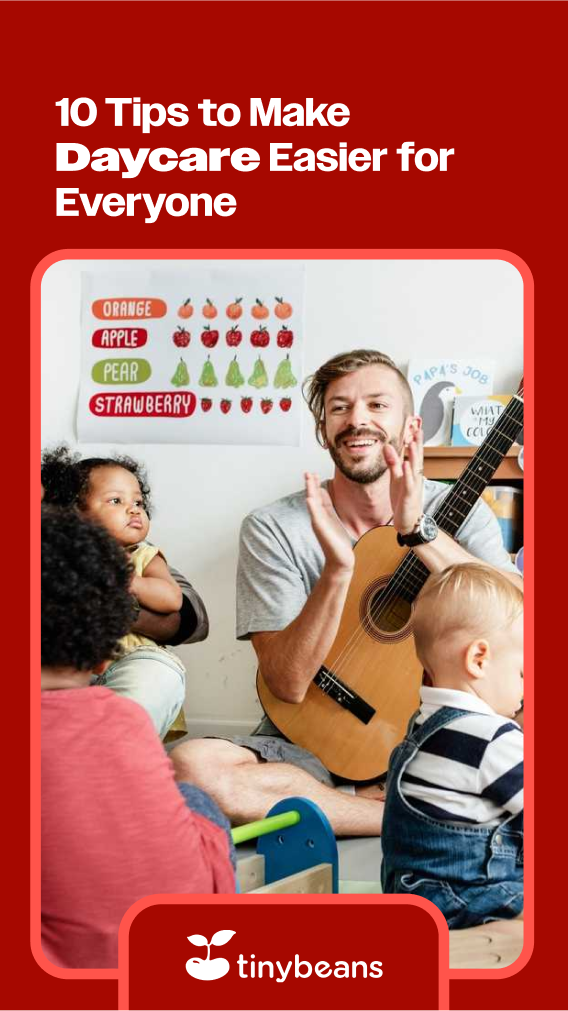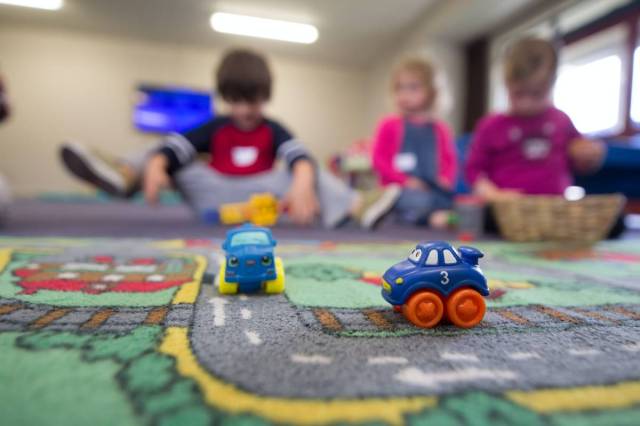Daycare can be daunting for everyone involved, but with a bit of planning, you and your childcare provider can navigate any bumps in the road to a perfect partnership. After all, that bitty babe and tiny tot of yours deserve as much comfort, TLC and security at daycare as they get at home. Read on for tips on making sure the transition to daycare is a smooth one.

Cover the Basics: Location & Hours of Operation
If you're new to the daycare game, know this: the busiest mornings of your professional career pre-baby were a cakewalk. When you add extras like two sets of clothing, labeled diapers, prepped and labeled bottles and baby food to your list—on top of a routine that's at the mercy of a pre-departure feeding, dressing, soothing and general parenting of your child—mornings take on a whole new meaning. Keep the logistics simple; make sure your daycare is both convenient and open during the hours you expect to need coverage.
Know & Be Aware of Child-to-Adult Ratios
According to ChildCare.gov, "low child-to-adult ratios and small group sizes help ensure that your child gets enough one-on-one attention from an adult who is available to take care of each child’s unique needs. This helps children feel safe and secure and reduces feelings of being overwhelmed—for both children and adults." Since adults are better able to watch and respond to a smaller group, children will be less likely to get injured or sick. Check your state's requirements here. In general, the younger the children, the more trained adults should be present, and the smaller the group size should be.
Accept That It Will Be Stressful at First
The first days and weeks of delivering your child to daycare will be difficult. You'll worry. They'll cry. You might cry. If you accept that you're running a marathon, not a sprint, your difficult mornings will eventually become rare, and you'll find yourself arriving at pick-up to find your child happily engaged and not quite ready to leave.
As you work through the first months of daycare, you'll undoubtedly question your choices. For every article suggesting there could be a negative impact on your child of daycare, there's another one pointing towards a positive outcome for your child from being in a group care setting. Just remember that no matter what the experts say, you are the expert on your child and how he or she is adjusting to childcare.
Communicate
According to Karen Nemeth, EdM, via naeyc.org, parents shouldn't be afraid to share information with a childcare provider, because "the more the teacher knows about your child, the better they can support play, learning, and development. And the more you know about how your child is spending their day, the better you can support learning at home. Remember that you and the teacher both have your child’s wellbeing at heart."
If you find pick-up times to be hectic, try to engage your child's daycare provider via email, text or during drop-off time. The more teachers understand what makes your child unique, the more they can meet his needs, encourage progress and celebrate accomplishments every day.

Don't Linger
We've been there. Leaving you mini-me can be excruciating, especially if she's having a major meltdown. But for the sake of everyone's sanity, sometimes it's best to kiss-and-run. Remember, the drop-off is about them, not you. Crying in the car—if you need to shed tears—sets your kiddos up for more success than if you do it in front of them.
Establish Routines
"Most children entering preschool are socially and emotionally able to self-regulate their emotions and behaviors, which means that increased expectations of your child around self-care tasks—such as getting dressed, putting on shoes, and getting ready to leave the house using verbal rather than physical 'help' to complete the tasks where possible—can help tremendously as he or she transitions into a new daycare setting," explains Lydia Criss Mays, PhD, Early Childhood and Elementary Educational Consultant.
Translation: Give your child a task that will engage him or her in the process of going to daycare each day. Let them place their diapers in their bags, put on their shoes or pack their snacks. A routine that includes them becomes a routine they can embrace.

Talk It Out
In Young Exceptional Children, by Hoffman & Hughes, "research shows parents who start preparing their child for school by talking about expectations at school, appropriate school behaviors and regularly engage in 'sit down' listening activities help ease the transition into preschool by exemplifying routine and building self-confidence, curiosity, self-control and more." The more you talk to them about what's going to happen, the less worrisome the transition into daycare is when it actually happens.
Adjust to the Daycare's Schedule
As a parent, you reign supreme in determining the best snack, nap, screen, bath and bed time—even if it sometimes doesn't go like clockwork. However, when your child begins daycare, he becomes used to an entirely different rhythm during the day. To make life easier on you, your child and your daycare provider, find out what schedule your child follows during the week, and try to align with it on the weekend. Just keep in mind—your tot may be more tired on the weekend and may nap longer.

Give Yourself a Minute
Adjusting to a job outside of the home—assuming that's the reason you've decided to go the route of a full- or part-time daycare—is no small task. The feeling of being stretched thin and pulled in multiple directions can sometimes be overwhelming. Find a minute before picking your kids from daycare to do something for yourself. Whether it's as simple as finishing your coffee in your car or allowing yourself 15 minutes for a brisk walk, you'll find yourself recharged and ready to put on that Super Parent cape once again.
Show Appreciation
One mom with whom we spoke just finished her first year of full-time childcare and summed this thought up perfectly. "Invest in the caretakers—no matter how busy you are at drop-off or pick-up. Take time to chat with them about your kiddo at the beginning and end of the day. Be friendly and nice no matter how busy you are, because these people are looking after your very best thing! Build them up so that they are in the best possible position to build your child up."
Forbes backs up this line of thought, citing Organizational and Leadership Development Consultant Mary Abbajay. "It doesn’t matter where we sit in the organizational chart, saying thank you to those above, across or below us helps everybody feel appreciated, valued and rewarded. And the gratitude spillover effect is enormous: people who experience gratitude are more likely to feel happier and spread that happiness, increasing trust and collaboration among colleagues."
—Shelley Massey
RELATED STORIES:
Kids Who Go to Daycare Do This Better Than Kids Who Stay Home
How To Rock Daycare Like a Boss When You Go Back to Work
What Happens if My Kid Curses in French? (& Other Daycare Questions)
Daycare or Bust: Everything Your Baby Needs On the First Day

Tired new parent?
Subscribe to our weekly newsletter packed with expert tips and simple solutions that make life with baby less exhausting—and more fun.
By subscribing you agree to Tinybeans Terms and Privacy Policy











